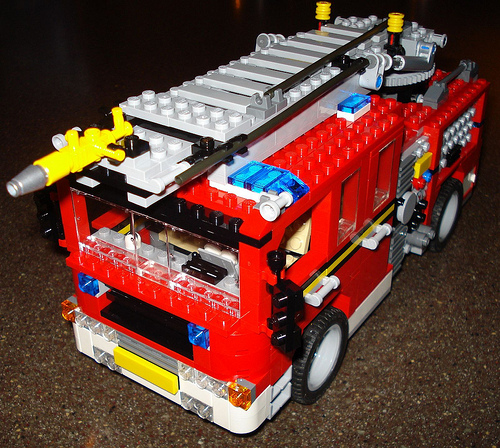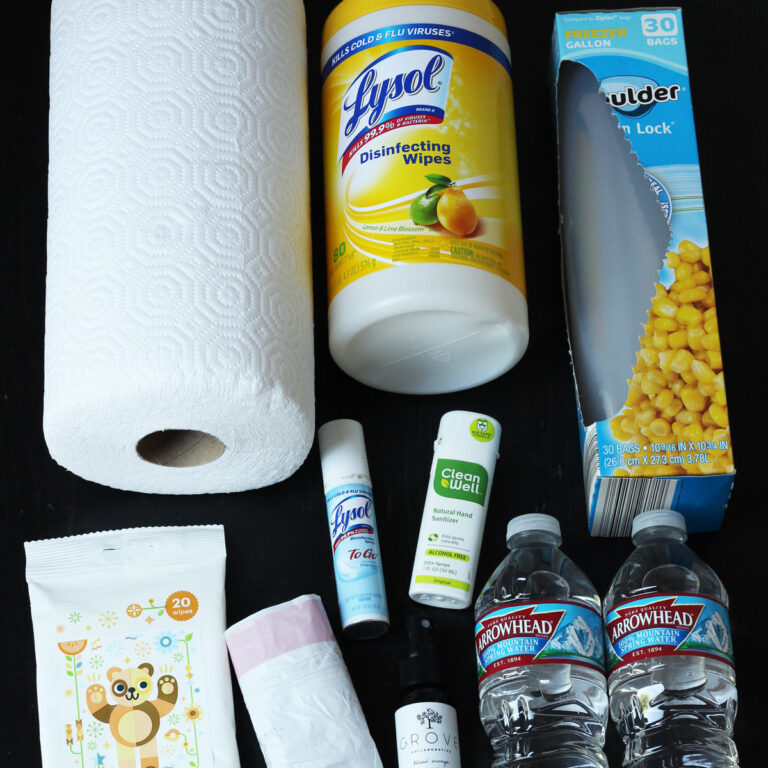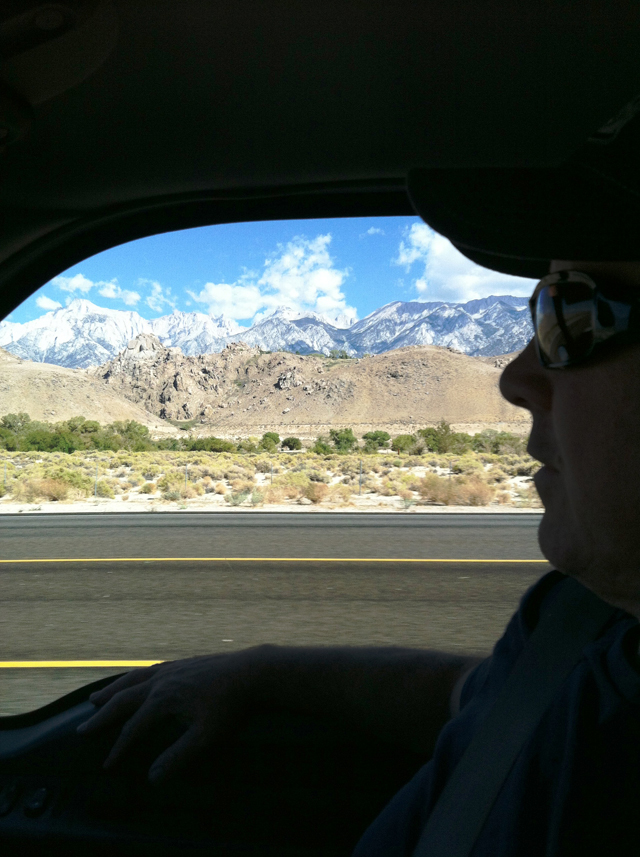How Prepared Are You?
As an Amazon Associate I earn from qualifying purchases. For more details, please see our disclosure policy.

Want to save this post?
Enter your email below and get it sent straight to your inbox. Plus, I'll send you time- and money-saving tips every week!
photo source
Want to save this post?
Enter your email below and get it sent straight to your inbox. Plus, I'll send you time- and money-saving tips every week!
My sister was without power for six days in the wake of Irene recently. While they were all fine and healthy, it was hard to go that long without a basic utility. Thankfully, they had warning in order to prepare — and at least picked up a camping stove before the storm hit.
Many of you possibly experienced something similar.
With a range of natural disasters that could hit at any moment, it’s important for us as parents to consider how we can be prepared. We don’t always get warning.
I know that for us, we aren’t as prepared as we could or should be. Honestly, the idea of stocking 3 days of water for 8 people seems daunting to me. Where will I store it?
Getting Prepared
However, stocking emergency water supplies is not as daunting as a true emergency would be. It’s better to be prepared. And really, I would rest easier knowing that if an emergency struck, we would have what we needed. You know, in that “tackle a nagging task” kind of way.
Some things for us to ask ourselves:
- Do we have extra water?
- Do we have nonperishable foods and a method to cook them if the power should go out?
- Do we have an evacuation plan?
- Do we have a plan to contact family in the event of an emergency?
- Have I backed up my photos and other important information and stored them someplace safe?
- Do I have a bag packed that we could take with us in the event of an evacuation?
Have I forgot something? What are the basics that you consider important?







I was in San Diego yesterday at the MCRD for my little brother’s graduation. I had read your post and put it on my list of things to do, but I wish I had packed some stuff before leaving home! Being away from home during a blackout kinda throws you for a loop. An emergency kit is great for home but even more useful when on vacation. Luckily I had packed lots of food and had a hand crank flashlight in my car. It would have been nice to have more though. I only had a buck on me and was thankful I didn’t need any money. 🙂
Amen, sistah. We were talking about the poor people on vacation and those who had to be rescued from the rides at Legoland and Sea World. Definitely pays to pack emergency supplies for a trip!
I thought of you, Jessica, when I read the news about SoCal/San Diego and beyond losing power yesterday. Your post on being prepared was timely!
LOL, yes. I was lamenting last night that I wasn’t better prepared. But, hubs reassured me that we really didn’t lack anything. (I would have felt better with a few more batteries, candles, and light sticks.)
The light sticks were the highlight of the evening. Lucky to have found some in a drawer. The girls loved having them for their night light. We didn’t get power back until 2 am.
This morning 4yo woke up crying that the lights were back on. She liked a dark house, apparently. 🙂
We have our “zombie kit” in rubbermaid tubs to be thrown in the car with survival gear, freeze dried food things, first aid, those silver heat blankets and things like that. My next step is if you can only evacuate on foot. I’m really at a loss for that. I suspect we’ll be lugging diapers and a wad of $1 bills! I got my cash stash in $1 and $5 because I don’t want to pay $20 for anything just because they can’t make change.
I just got a flash drive stick thingy to put all our ss cards/birth certs/medical info/insurance info on. I’m trying to decide where to keep it so it’s safe but also accessible.
Thanks for this post. Between the earthquake and hurricane and the almost constant 9/11 footage this has really been on my mind.
Mine, too.
Some great advice! Thanks to all who shared – and thanks for the reminder that I need to put “manual can opener” on my grocery list, again, since I keep forgetting to actually buy one. I have lots of canned goods but no way of opening them if the power goes out. Other than a hatchet. : )
One thing I wanted to add to the other great advice about having extra cash is to make sure you have smaller bills, too. I don’t remember which blogger it was, but I read a post written by someone who had been affected by the NYC blackout a few years back, and she said the few stores that were open weren’t able to make change since most people only carry $20 bills. Common sense, but I had never thought about it. We have always kept a “cash stash” hidden in the house, but after that I started making sure I had a pile of smaller bills in there, too.
This was a great reminder to me. Time to go to the bank!
I live in AL where the tornadoes came through on April 27th, the deadliest day from tornadoes ever in history. We had an F5 that ripped through 38 miles in our community and missed our home by 1/4 mile. Our area was without power for 14 days. The biggest lesson I learned is to keep a FULL tank of gas in the car! I had not filled up and thankfully my husbands truck was full. We had to siphen enough gas out of his truck into my vehicle to get me out of state. The nearest gas station that was in operation was over 1 1/2 hours away. Many had it even worse than we did and were virtually stranded. I have a little boy that is about 1 year and it was very difficuly just figuring out how to perform basic operations. Tornadoes are quite common in our town, so next season I will be much more prepared. Be sure to keep extra gas cans in the shed or at the least to fill the vehicles!
Great point about the gas tank! We are notorious for letting it get low before refilling.
We get a lot of wind storms here especially in November, December & January. We’ve often lose power. I forget to keep candles, matches, and flashlight in a place I can find it. This is a good reminder!
I live in earthquake country. I bought a predone kit from Costco and then just added to it. I got a hand crank radio and flashlight. Added pet food bars and bowls to separate bag.
I need to get insurance information together to put in our fire safe.
We do not have the same disasters as in other areas of the country, but one thing that we found is vital here…is a winter disaster kit to keep in the car. If there is a blizzard and a tree knocks out the power to the house, you can be without heat. Make sure you have an emergency heat back up plan to prevent pipes from freezing. Make sure it able to be used inside and will not give off dangerous fumes.
In the car make sure you carry matches, candle, extra socks, gloves and high energy snacks. If you have room, a folding shovel and sand is good. Make sure when you are in the car you do not put your coat far from you. Last winter a friend jumped out of her car as it rolled down the side of a mountain, broke her hip and was stranded on the side of a mountain without a coat for 24 hours.
If you have warning, make sure your medications are filled, if possible.
we just went through the power outage with Irene as well. Fortunately, although we had no power and lost our entire freezer/fridge contents, we have water on the side of our house so it wasn’t a huge chore to get “flushing” water. Things I’ll make sure I have next time: D batteries – listening to a radio would have been nice
– battery operated lantern – the gas one was great but I would have liked a battery operated ones the kids could have used in their rooms. Cash and Gas – critical since we ended up having to buy supplies and food here and there. LARGE gas tank if you have a generator – neighbors were scouting out gas stations because they only had the 2 gallon gas tanks. Stocked propane tank for gas grill. charged dvd players, ipods, cell phones or way to charge them (in car, small generator etc). Hand sanitizer – we had one in the bathroom, one at the kitchen sink and one in the cooking station we set up outside. mostly, though, its made me look at my house differently – the clutter made life difficult and I really am embracing the thought of clearing out my house so we can find things easily and don’t have to worry about cluttered closets etc when navigating by headlamp. most of all though I’d say embrace the downtime – make the best of it. Our family pulled together as a team and that made all the difference in having good attitudes and making the best of the unplugged time on our hands!
Hand sanitizer! Great idea!
I have been thinking about this for awhile now even though we are (thankfully) not in a hurricane/flood area nor have earthquakes all that often (Sacramento Valley area). Well, after 10 years of prodding from my husband, we finally went camping as a family this summer, and I realized that the camping gear is perfect for disaster preparedness! So, I’ve got most of the gear we would need. I just need to work on the food and paperwork part for our 72 hour kit. We’ve got 2 tanks for our BBQ so we *could* cook at home at least. I think the comments about shoes are so important too.
I think preparing for fire/evacuation/emergency plan probably holds importance for all of us, too.
I like your reminder about the grill.
Don’t forget things such as a manual can opener, soap, blankets, and a way to cook/heat. Living in a small town on the end of the power grid, we are usually the last ones to get our power back on. During winter storms, our power can go out for a few days to a week. I typically stock up on snacky foods, bread, milk and batteries for the flashlights. We have a propane cooker to use for heat and to cook. By the grace of God, we haven’t had a need for it. But its nice to know its there.
This is an area I unfortunately have lots to say about – 3 years out from Hurricane Ike washing away the first floor of my house and we’re still recovering. Some highlights of my lessons learned:
1) Evacuation routes – Have 2 evacuation routes (in different directions). If you have pets find a place(s) to board them near where you are evacuating to – it’s peace of mind if needed. We had to board our cat for 3 days while we figured out our next steps. Not having to worry about the cat during this time – priceless.
2) Pets – I won’t go in detail here but imagine the worst. If you love your pets – take them with you. It’s hard to evacuate with pets but it’s almost certain death if you don’t. Trust me on this one. If you absolutely can not evaucate with your pets at least let them loose in the yard/house as it may be their only chance at survivial. Dogs on leashes/in cages drowned. The dog in the neighborhood that was left loose in the yard was able to get on top of a neighbors garage and survive.
3) Refrigerator/Freezer – empty it. Yes, throw away the food before leaving. My refrigerator was floating so moot point for me but my friend’s house did not flood. Two weeks later she returned to the house and had to deal with a refrigerator full of rotten food. She tried to save the refrigerator and couldn’t. $500 worth of food vs $2000 for a new refrigerator.
3) Clothes – I packed for 4 days. And I packed the clothes I usually reserve for cleaining the house and gardening. I figured I’d be lounging in a hotel for 2 days max. It turned out to be the clothes I wore for the next 8 weeks. Next time, I bring the clothes I like and are presentable in public. I lost my enitre wardrobe (not totally a bad thing) and clothes shopping wasn’t on the top of my list of things to do in the aftermath. And don’t foget functional SHOES! Flip flops – not so functional.
4) Cash – lots of things don’t work without electricity – like debit/credit card machines. Want food? Gas? Cleaning supplies? Need cash. And you won’t be getting it from an ATM.
5) Gas – have a full tank to get you out of the disaster zone. Need electricity for the gas pumps. And need gas tankers to deliver gas. Both of these go awry during a disaster.
6) Kids – remarkably resilient (2 and 4 at the time). Honesty and a we’re in this together approach worked well. We were able to put them in to daycare for 8 weeks where we evacuated 3 states away. This made it easier to deal with the aftermath and also provided a chance for major freak outs/breakdowns not in front of the kids when needed.
7) Expectations – I thought everything would be back to “normal” by Christmas. Three years later and close but not yet there. It takes TIME. A long, long time. It is a full time job to deal with insurance, contractors, etc…which makes it difficult when you already have a job.
8) Cars – if you are evacuating from a potential flood event take your extra cars/boats and find a parking garage where you live and park it on an upper floor.
9) Insurance – I was not very educated about insurance in a high risk area – fortunately when I bought my house I told the insurance agent to get me what he thought I needed. Not the best way to buy insurance but wow did having good insurance pay off. Educate yourself about your insurance policy and if you live in a high risk area – having a good policy can make all the difference. If we hadn’t had good insurance (we’d only been living in the house for 9 months) we probably would have thought seriously about mailing the keys to the bank and walking away.
10) Big plastic bins – useful for gathering/packing the essentials to evacuate. In the end we took ourselves, cat and photos/irreplaceble items. We lost pretty much everything in the garage first floor of the house. The only regret I have is my wedding dress which after tyring to get it professionally cleaned I had to throw away. I thought it was in the attic. Everything else was just stuff. No more clutter!
11) Humor – keep a positive outlook. It’s a time when you need your spouse/partner, family and friends the most. Also realize that most people you know not experiencing the awful event won’t fully understand what you’re going through – don’t get frustrated by it. Unless it’s happened to you it’s very difficult to understand. For example – we were bathing in the kiddie pool in the backyard for 4 months while we had no working shower and my parents were asking me about when I was going to do the landscaping.
Sorry for the long post – I could go on forever. This is just some of the major points.
Those are some great and helpful points! I am sorry you suffered such disaster, but thanks for sharing with us!
It’s super helpful to hear the real life stories. Thanks for these tips!
Wow, thank you for sharing your hard-earned wisdom! I’m taking notes.
Tornado country hear I have to say shoes, shoes, shoes! I always try to make sure my kids are wearing them when we head for the basement (and they usually are because we have to go to my brother-in-laws across the street) but I still try to put a pair of at least flip flops in the bag last minute. Also a flash light and batteries!
Good Advice!
We have food storage and emergency kits. The best advice I was ever given was to buy foods that you regularly eat. We keep a couple of cases of canned beans around. Although we like to use dry beans we use the canned stuff in a pinch or if we need to throw together a dish last minute. It works for us.
Do you have a set schedule for rotating what you’re storing and then replacing it? And do you store it in a separate area from the kitchen?
No, just first in, first out and I don’t buy too much of something that will expire before we use it. Every 3 months I clean clean my shelves and that’s when i check to see if something needs to be used up ASAP.
Here is what most of my pantry and food storage looks like: http://thedollarholleringhomemaker.blogspot.com/2011/09/tour-of-my-pantry-and-food-storage.html
This last spring, we left the house to seek shelter for a tornado warning. I took along the portable hard drive back-up and the cameras, but realized I need to be more prepared with the other information, like the insurance papers and other documents like birth certificates & passports.
Fortunately, my immediate area was not hit by that tornado. I’m still working on my goal, though, to have a good list for the insurance company and video/camera documentation to take along with me in case of emergency. I realize there is no way that I could remember all the lost items if something came along and took away our home, much less show any “proof” of some of those items to the insurance company. The list and video will also help when you review your policy just to make sure you have adequate coverage. It’s amazing how much “stuff” we’ve accumulated in almost 20 years of marriage, but just replacing the basics may be an overwhelming process if there ever is a true emergency.
One thing we found important to keep handy in our 72 hr kit is extra shoes. We are in the midwest and after the Joplin tornado I have sworn that if we ever have to head to the basement again (and we have!) that we would do it with shoes on. I saw too much footage of people trying to climb barefoot out of the rubble and broken glass. Even if it is just flip-flops, you might want them in a disaster situation.
Flipflops are cheap. Great thing to think about next time Old Navy has one of their sales!
Since Irene, we are putting together a bag to grab in an emergency. One thing we are adding is a ziplock with copies of all ID and banking information as these are hard to replace. Also, medical information and allergies. Lots to think about!
We just lost power for the longest stretch we’ve ever endured, so this preparation stuff should be at the top of the list, right? (Wrong!)
We have some basics, like flashlights, food and extra water. (And a lantern–thank goodness for that last month!) But my good intentions to put together a full 72 hour emergency kit haven’t yet produced any such thing. Thanks for the reminder, Jessica. (And I love the photo!)
you might think about having extra water if you have pets and be sure their shots are up to date if you have to leave the home and leashes are handy.
Such a great question that a family needs to not only ask themselves, but then ACT on!
When we relocated from Western Australia to Los Angeles in 2008, we prepared our Earthquake Emergency kit. I was in the 1994 Northbridge Earthquake and suffered PTSD afterwards, so there was no way I wasn’t going to be prepared. 10 months later, we were moved to Houston, and within a month I had transformed our Earthquake kit into the Hurricane Emergency kit.
16 months later we were notified we were being transferred back to Australia, so we spent the next 2 months eating through our emergency food (then donated the rest, you can only eat so much canned corn in a 6 weeks period). I put some of the C-rations in our garage sale and they were snapped up within 10 minutes – those Houstonians know a good emergency kit supply when they see one!
I hope people take precautions!